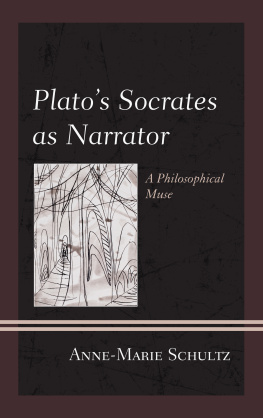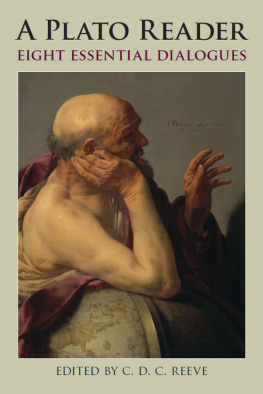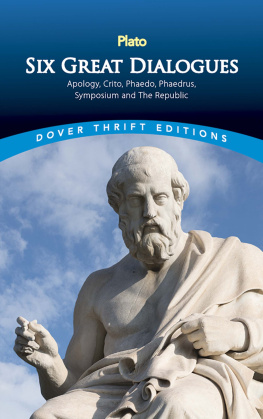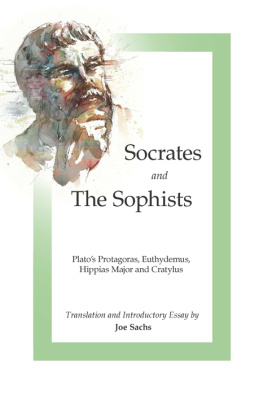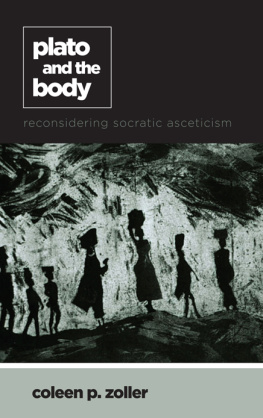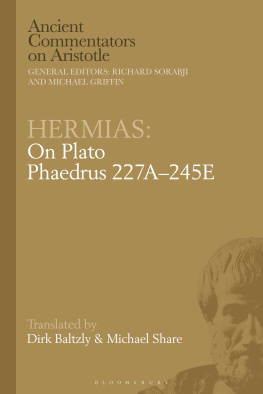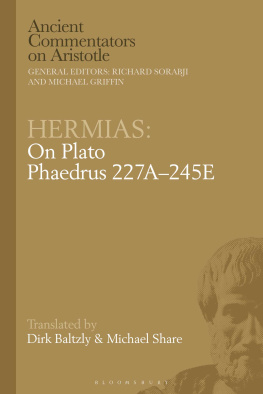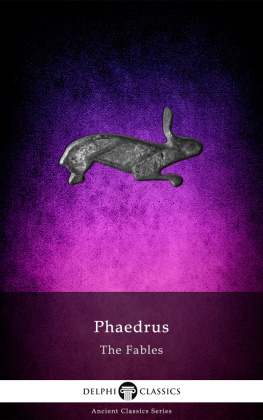
PHAEDRUS
PLATO stands, with his teacher Socrates and his pupil Aristotle, as one of the shapers of the entire intellectual tradition of the West. Born c. 427 BC , he came from a family that had long played a prominent part in Athenian politics, and it would have been natural for him to follow the same course; the reason for his not doing so, according to the seventh of the collection of letters attributed to him (all of them almost certainly inauthentic), was his disillusionment with the kind of politics that could lead, among other things, to the execution in 399 of Socrates. Rather less plausibly, the same letter suggests that Plato's several visits to the court of Dionysius II, tyrant of Syracuse in Sicily, were motivated by a desire to put his political theories as developed above all in his masterwork, Republic into practice. The reform of society on an ethical basis certainly remained one of his central theoretical concerns. However, the focus of his thinking was on ethics itself, in which he first followed and then went beyond Socrates, and on metaphysics and the understanding of reality. In the mid-380s, in Athens, he founded the Academy, the first permanent institution devoted to philosophical research and teaching, and an institution to which all Western universities like to trace their origins.
Plato wrote more than twenty philosophical dialogues, appearing in none himself (most have Socrates as chief speaker). His activity as a writer seems to have lasted over half a century; few authors in any language could claim to rival his particular combination of brilliant artistry and intellectual power. He died in 347 BC .
CHRISTOPHER ROWE is Professor of Greek in the University of Durham, and from 1999 until 2004 held a Leverhulme Personal Research Professorship. Until 1995 he was H. O. Wills Professor of Greek in the University of Bristol, and he has served at various times as President of the International Plato Society, Chair of the Council of University Classical Departments, Chair of the Council of the Classical Association, President of the Society for the Promotion of Hellenic Studies and joint editor of Phronesis: A Journal for Ancient Philosophy (Leiden). His books include Plato (second edition, 2003), Reading the Statesman (edited volume, 1995), The Cambridge History of Greek and Roman Thought (edited with Malcolm Schofield, 2000) and New Perspectives on Plato, Modern and Ancient (edited with Julia Annas, 2002). In Sarah Broadie and Christopher Rowe, Aristotle, Nicomachean Ethics (2002), Sarah Broadie's philosophical commentary is accompanied by his translation. He has also translated, and/or written commentaries on, Plato's Phaedrus (1986), Phaedo (1993), Statesman (1995) and Symposium (1998) and, with Terry Penner, has written a monograph on the Lysis. His present project is a comprehensive treatment of Plato's strategies as a writer of philosophy.
PLATO
Phaedrus
Translated with an Introduction and Notes by
CHRISTOPHER ROWE
PENGUIN BOOKS
PENGUIN CLASSICS
Published by the Penguin Group
Penguin Books Ltd, 80 Strand, London WC2R 0RL , England
Penguin Group (USA) Inc., 375 Hudson Street, New York, New York 10014, USA
Penguin Group (Canada), 10 Alcorn Avenue, Toronto, Ontario, Canada M4V 3B2 (a division of Pearson Penguin Canada Inc.)
Penguin Ireland, 25 St Stephen's Green, Dublin 2, Ireland (a division of Penguin Books Ltd)
Penguin Group (Australia), 250 Camberwell Road, Camberwell, Victoria 3124, Australia (a division of Pearson Australia Group Pty Ltd)
Penguin Books India Pvt Ltd, 11 Community Centre, Panchsheel Park, New Delhi 110 017, India
Penguin Group (NZ), cnr Airborne and Rosedale Roads, Albany, Auckland 1310, New Zealand (a division of Pearson New Zealand Ltd)
Penguin Books (South Africa) (Pty) Ltd, 24 Sturdee Avenue, Rosebank 2196, South Africa
Penguin Books Ltd, Registered Offices: 80 Strand, London WC2R 0RL , England
www.penguin.com
This translation first published in 2005
Introduction and Further Reading Christopher Rowe, 2005
All rights reserved
The moral right of the translator has been asserted
Except in the United States of America, this book is sold subject to the condition that it shall not, by way of trade or otherwise, be lent, re-sold, hired out, or otherwise circulated without the publisher's prior consent in any form of binding or cover other than that in which it is published and without a similar condition including this condition being imposed on the subsequent purchaser
ISBN: 9781101488782
Contents
Acknowledgements
I offer thanks to Adrian and Lucinda Phillips (of Aris & Phillips), who first invited me to tackle the Phaedrus, and who published the volume that is the direct ancestor of the present one (Plato: Phaedrus, 1986; second edition, 2000); to David Brown of Oxbow Books, who as the new owner of the Aris & Phillips imprint gave permission for me to reuse my translation (though in the event I have significantly modified it) and scattered material from the commentary; to David Hopkins, who was largely responsible for the translation of a number of short verse passages Plato includes in his text; to the Leverhulme Trust, without whose grant to me of a Personal Research Professorship this second journey of mine through the Phaedrus would not have been possible; to Terry Penner, in whose company my appreciation of Plato's philosophical acuity and literary sophistication continues to develop; to my wife Heather, for perpetual support (and tolerance) and for reading the proofs; and to Laura Barber, for proposing to me the project of a new Penguin Phaedrus.
CHRISTOPHER ROWE
June 2004
Chronology
We know as little about Plato's life as we do about most of his peers. Plato is chiefly known as a writer, of course, but what passed for publication in ancient Athens was so far removed from the modern world that it is hard to say even that a dialogue was published around such-and-such a year. The relative dating of the dialogues is often controversial too, and many scholars nowadays prefer to study each dialogue on its own, rather than as part of a corpus. The situation is confused by the presence of a number of works which are spurious or at least of uncertain authorship: they have been omitted below. Nevertheless, study of Plato's writing style has resulted in a broad division of the dialogues into three groups, which is reflected in the (very rough) chronology below. For this division, see especially Charles Kahn, On Platonic Chronology, in Julia Annas and Christopher Rowe (eds), New Perspectives on Plato, Ancient and Modern) Cambridge, MA: Harvard University Press, 2002), pp. 93 127.
c. 427 BC Birth of Plato, son of Ariston, in Athens into a well-connected and noble family. The story that the name Plato derived from the adjective platus, broad (referring to the width of the great man's shoulders; or his intellectual capacity; or the breadth of his style) has been discredited.
418 416 Dramatic date for the dialogue between Socrates and Phaedrus.
The defeat of Athens in the Peloponnesian War (which started in 431) signals the temporary end of the democracy which had governed Athens for most of the last hundred years. It is replaced by a cruel junta of oligarchs, at least two of whom are members of Plato's immediate family. The Thirty Tyrants, as they become known, last only a few months before being overthrown in a civil war and replaced by a revived democracy.
Next page

